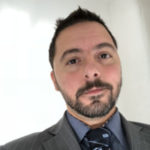 Poliedra is a consultancy and services centre, created 25 years ago at Politecnico di Milano, Italy. Gathering about 25 researchers, Poliedra’s core working themes are environmental sustainability, mobility, participation, decision support systems, smart cities and communities. We met Gianluca Lentini, researcher on sustainable mobility at Poliedra, to learn more about the consortium’s activities and to better understand its connections with Euromontana.
Poliedra is a consultancy and services centre, created 25 years ago at Politecnico di Milano, Italy. Gathering about 25 researchers, Poliedra’s core working themes are environmental sustainability, mobility, participation, decision support systems, smart cities and communities. We met Gianluca Lentini, researcher on sustainable mobility at Poliedra, to learn more about the consortium’s activities and to better understand its connections with Euromontana.
Euromontana : Can you introduce Poliedra?
Gianluca: “Poliedra is a research consortium, a private non-profit organisation. We work on sustainable development and more precisely on two main issues: sustainable environment and sustainable mobility and transport. Generally speaking, our objective is to direct public administrations mostly, but also other private partners, towards sustainability.”
How do you work with those public and private entities?
“We work closely with some Italian regions for example, mostly with the region of Lombardy. We work as technical assistance to the environmental authority of the region of Lombardy. In this role, we direct the environmental criteria towards sustainability. We are also involved in several projects: European projects, regional and local projects and we work as a consultancy in other type of projects with private entities. Our goal is to find sustainable solutions for public and private organisations by exploring possibilities and making recommendations. For example, on projects related to mobility and transport we explore cases for sustainable mobility such as electric mobility, shared mobility and pooled mobility. As a research centre we don’t have the competency to create policies, but I am proud of our potential in helping to shape them by creating guidelines and policy recommendations.”
How did you come to work on sustainability in mountain areas?
“We were involved in various projects related to mountain areas. Poliedra was for instance consultant in the Alpine Space project INTESI, which was born within Euromontana. We were the technical assistance to region Lombardy in the project. Together with the region, we wrote the project’s final recommendations to policy makers, focusing on the improvement of provision of services of general interest in mountain areas.
We are also currently involved in the Alpine Space project dedicated to smart villages. It is focused on the implementation of a smart transition in rural mountain areas, with 6 countries and 12 test areas located in the Alpine region. Our role is to assess and rate the smartness of those test areas; we have created indicators and smart transition objectives for these territories, depending on their specific priorities like agriculture, smart governance, smart transport, and so on and we have created a methodology to rate and assess their smartness and potential.”
Your work is indeed closely connected to Euromontana’s activities. When did Poliedra decide to become a member?
“Poliedra joined Euromontana in 2015 under my own proposal. I was before working at ERSAF and was ERSAF’s representative at Euromontana. When I entered Poliedra, I proposed them to become a member.”
What are Euromontana’s inputs for the work of Poliedra?
“Euromontana has been helpful in two ways. Firstly, being a Euromontana member offers a lot of opportunities to discuss topics which can be submitted as projects. When I was for example a fresh Euromontana member, I came to Brussels and together with Sogn og Fjordane County Council we developed the idea of the P-IRIS project. The issue did not come to my mind before, so the idea of the project was born thanks to Euromontana, as for the Smart Villages project. Secondly, Euromontana has encouraged the cooperation between its Italian members, which are now meeting once a month to come to common positions. Sometimes, people from the mountains are very pessimistic. It’s important to remember there is a great potential but only if you organise yourselves. Euromontana is a powerful tool for self-organisation and has very concrete successes to share with others.”
Download Gianluca Lentini’s full interview in PDF.
24 April 2019










